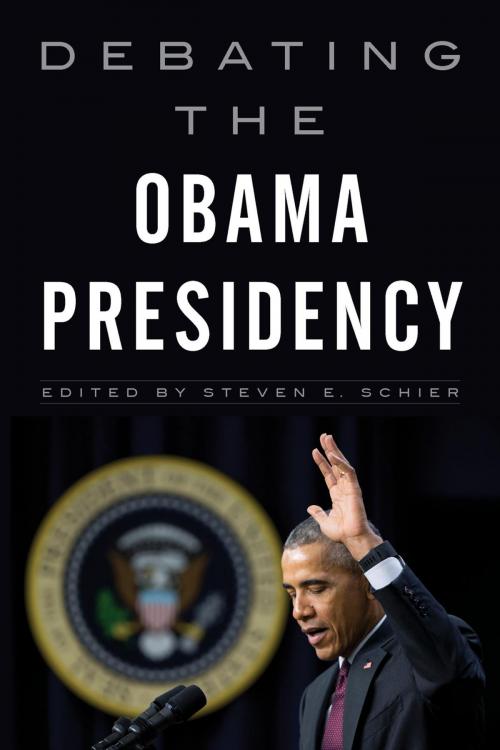| Author: | ISBN: | 9781442261259 | |
| Publisher: | Rowman & Littlefield Publishers | Publication: | September 22, 2016 |
| Imprint: | Rowman & Littlefield Publishers | Language: | English |
| Author: | |
| ISBN: | 9781442261259 |
| Publisher: | Rowman & Littlefield Publishers |
| Publication: | September 22, 2016 |
| Imprint: | Rowman & Littlefield Publishers |
| Language: | English |
This is the first book to present both the arguments for and against Barack Obama’s presidency and its policies. In it, prominent political scientists and Washington think tank scholars address Obama’s domestic, economic and foreign policies and his political legacy. Contrasting perspectives assess the consequences of the large aspirations of the Obama presidency and the political and policy challenges Obama encountered in the pursuit of those aspirations. Barack Obama’s project in the White House involved installing lasting changes in national policy and politics. Institutionally, the Obama administration sought to preserve control of Congress through maintenance of reliable partisan Democratic majorities, and enhance influence over the federal courts through a steady stream of liberal judicial appointees. The administration sought increased autonomy over the executive branch by a reorganizations spawned by a national economic crisis and an ambitious domestic policy agenda. Politically, the Obama administration sought the entrenchment of consistent Democratic electoral majorities. Such large ambitions have generated enduring controversies surrounding his presidency, controversies that receive a full airing and debate in this volume.
Contributions by Alan I. Abramowitz, Emory University; Andrew E. Busch, Claremont McKenna College; Peter Juul, Center for American Progress; Lawrence Korb, Center for American Progress; William G. Mayer, Northeastern University; Ruth O’Brien, City University of New York Graduate Center; John J. Pitney Jr.. Claremont McKenna College; Danielle Pletka, American Enterprise Institute; Daniel E. Ponder, Drury University; Steven E. Schier, Carleton College; Raymond Tatalovich, Loyola University Chicago; and John Kenneth White, Catholic University of America.
This is the first book to present both the arguments for and against Barack Obama’s presidency and its policies. In it, prominent political scientists and Washington think tank scholars address Obama’s domestic, economic and foreign policies and his political legacy. Contrasting perspectives assess the consequences of the large aspirations of the Obama presidency and the political and policy challenges Obama encountered in the pursuit of those aspirations. Barack Obama’s project in the White House involved installing lasting changes in national policy and politics. Institutionally, the Obama administration sought to preserve control of Congress through maintenance of reliable partisan Democratic majorities, and enhance influence over the federal courts through a steady stream of liberal judicial appointees. The administration sought increased autonomy over the executive branch by a reorganizations spawned by a national economic crisis and an ambitious domestic policy agenda. Politically, the Obama administration sought the entrenchment of consistent Democratic electoral majorities. Such large ambitions have generated enduring controversies surrounding his presidency, controversies that receive a full airing and debate in this volume.
Contributions by Alan I. Abramowitz, Emory University; Andrew E. Busch, Claremont McKenna College; Peter Juul, Center for American Progress; Lawrence Korb, Center for American Progress; William G. Mayer, Northeastern University; Ruth O’Brien, City University of New York Graduate Center; John J. Pitney Jr.. Claremont McKenna College; Danielle Pletka, American Enterprise Institute; Daniel E. Ponder, Drury University; Steven E. Schier, Carleton College; Raymond Tatalovich, Loyola University Chicago; and John Kenneth White, Catholic University of America.















